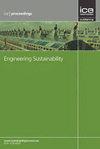高层模块化集成施工kpi系统框架研究
IF 1.5
4区 工程技术
Q3 ENGINEERING, CIVIL
Proceedings of the Institution of Civil Engineers-Engineering Sustainability
Pub Date : 2021-12-15
DOI:10.1680/jensu.21.00048
引用次数: 3
摘要
为实现高层建筑的可持续发展,在高层建筑中引入了模块化集成结构。与传统建筑相比,高层MiC颠覆性地改变了施工过程,因此有必要系统地了解其性能,但在以往的文献中尚未得到充分的报道。因此,本文旨在为项目利益相关者建立一个新的关键绩效指标框架,以全面衡量和有效地对高层MiC项目的绩效进行基准测试。该框架是基于可持续建设的概念开发的,涵盖了社会、环境和经济方面。通过全面的文献综述、专家访谈和焦点小组会议,在三个可持续性方面建立了32个kpi。建议项目利益相关者采用八个步骤的过程来采用这些kpi,以在三个层面(即整体建筑、非现场和现场以及模块化工程)衡量MiC绩效。通过实例分析表明,该框架可以有效地衡量高层混凝土混凝土结构的可持续性,并可与传统的混凝土混凝土结构进行比较。该框架填补了高层模块化建筑绩效测量的知识空白,并为未来MiC可持续性的定量基准制定提供了方法论基础。本文章由计算机程序翻译,如有差异,请以英文原文为准。
A Systematic Framework of KPIs for Measuring High-Rise Modular Integrated Construction
Modular integrated construction (MiC) has been introduced in high-rise construction for achieving sustainable development. As high-rise MiC disruptively transforms the construction process compared with conventional construction, it is imperative to systematically understand its performance, which however has not been sufficiently reported in previous literature. Therefore, this paper aims to develop a new framework of key performance indicators (KPIs) for project stakeholders to comprehensively measure and effectively benchmark the performance of high-rise MiC projects. This framework is developed based on the concept of sustainable construction that covers social, environmental and economic aspects. Through a comprehensive literature review, expert interviews, and a focus group meeting, 32 KPIs are established in the three sustainability aspects. An eight-step process is suggested for project stakeholders to adopt these KPIs to measure MiC performance in three tiers, i.e., overall building, off-site and on-site, and modular works. A case study is then presented which demonstrates that the framework is effective in measuring the sustainability of high-rise MiC and applicable for comparing MiC with conventional practices. The framework fills the knowledge gap of performance measurement on high-rise modular construction and contributes a methodological foundation for future quantitative benchmarking of MiC sustainability.
求助全文
通过发布文献求助,成功后即可免费获取论文全文。
去求助
来源期刊

Proceedings of the Institution of Civil Engineers-Engineering Sustainability
ENGINEERING, CIVIL-ENGINEERING, CIVIL
CiteScore
3.70
自引率
16.70%
发文量
44
审稿时长
>12 weeks
期刊介绍:
Engineering Sustainability provides a forum for sharing the latest thinking from research and practice, and increasingly is presenting the ''how to'' of engineering a resilient future. The journal features refereed papers and shorter articles relating to the pursuit and implementation of sustainability principles through engineering planning, design and application. The tensions between and integration of social, economic and environmental considerations within such schemes are of particular relevance. Methodologies for assessing sustainability, policy issues, education and corporate responsibility will also be included. The aims will be met primarily by providing papers and briefing notes (including case histories and best practice guidance) of use to decision-makers, practitioners, researchers and students.
 求助内容:
求助内容: 应助结果提醒方式:
应助结果提醒方式:


